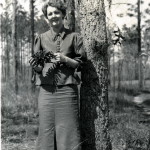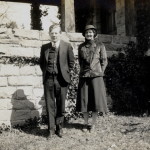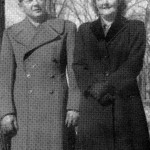Pine Mountain Settlement School
Series 04: ADMINISTRATION
Series 09: BIOGRAPHY – Directors
Glyn Morris, Director 1931-1942
Glyn Morris (1905-1993)
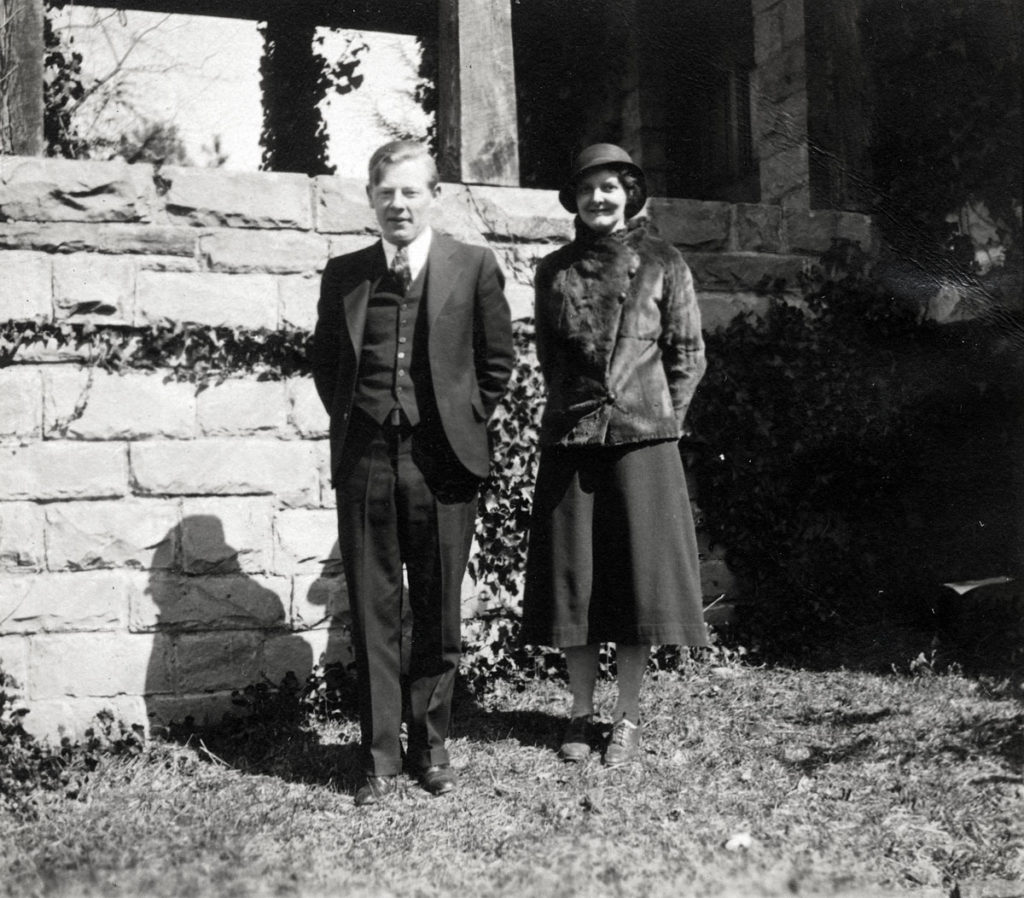
“Mr. and Mrs. Morris” – Glyn and Gladys Morris. [cobb_alice_048]
TAGS: Glyn Morris, progressive education, Gladys Jones Morris, Reinhold Niebuhr, Army Chaplains’ Corp, U.S. Army, WWII, Harlan County Planning Council, Southern Mountain Workers’ Conference, Alice Cobb, Council of Southern Mountain Workers, Presbyterian Church, Cooperative Store project, Community Service program, Rural Youth Guidance Council, survey courses, community life, student government, citizenship committee, Edmund Wilson
GLYN MORRIS Director, 1931-1942
In 1931, Pine Mountain searched and found a new Director for Pine Mountain Settlement School. Glyn Morris, born in Glyn Ceiriog, Wales, just 26 years past, brought to Pine Mountain his ties to the culture of the Old World but carrying the energy and dreams for building new decades of innovative change.
Born on February 20, 1905, the son of John and Emma Morris, Glyn came to the United States with his parents at the age of six and was a 1922 graduate of the James M. Coughlin High School, Wilkes-Barre, Pennsylvania. In 1931, Morris graduated from Albright College in Pennsylvania and Union Theological Seminary in New York City. He was well educated and eager.
GLYN MORRIS: His Application for PMSS Directorship
As the Executive Director of Pine Mountain, Morris was faced with an enormous task — win the heart of Angela Melville who was acting as Interim Director until the position could be filled, and pass muster with the remaining Search Committee! The comments of Miss Melville, to the School Search Committee, are stated in her very plain English and with her direct eye:
He is —- a plain man
very undersized
Nothing to look atHe is —- Sincere
Quietly enthusiastic
Gifted, I think
InterestedI think he can do the job. My only question would be the workers’ reaction to:
Size
Social Station
Youth — He is only 26.I think the children would like him as soon as they got his feel. I did.
When Glyn Morris was under consideration by the Board, one of its most prominent members, Darwin D. Martin, who was Chair of the Board of Trustees at Pine Mountain and Vice President of Larkin Company (a leading mail order house of the day), spoke in Glyn’s favor. As an executive at Larkin, Martin had one of the largest salaries in the U.S. at that date. He was well known nationally for his innovative management and enormous talents, Trained and influenced by Elbert Hubbard, a leader in the Arts and Crafts Movement, and the inventor of the library card-catalog system, Hubbard put his weight behind Morris.
He spoke to the hire of Morris in a letter to Evelyn K. Wells.
I am further encouraged to confidence in this young man in his twenty-seventh year by recalling the importance of my own work and responsibilities in earlier year, (I was but a boy of 18 when I had sufficient initiative to install what was, I believe, the first commercial — non-library — card index ever used.)
Following additional letters from BOT members, Elizabeth Hench and Evelyn K. Wells, who expressed misgivings about Morris’ lack of “social background,” Martin then continued his advocacy. He explained that he has also received a letter from another Board Member who spoke against the hire of Morris. The letter from Charles N. Manning did not change Martin’s mind. He announces to his fellow Board members
I suppose I must be very hard-boiled not to be prostrated by the two blows. Well, the die is [underlined] cast, and I am betting my standing in Pine Mountain circles on the little cuss.
Arthur Swift, an advisor to Morris in graduate school, received the following letter recommending Morris for the Pine Mountain Position. Max Nelson, the Head Worker at Union Settlement House in NY, provided one of the most crucial “hands-on” recommendations.
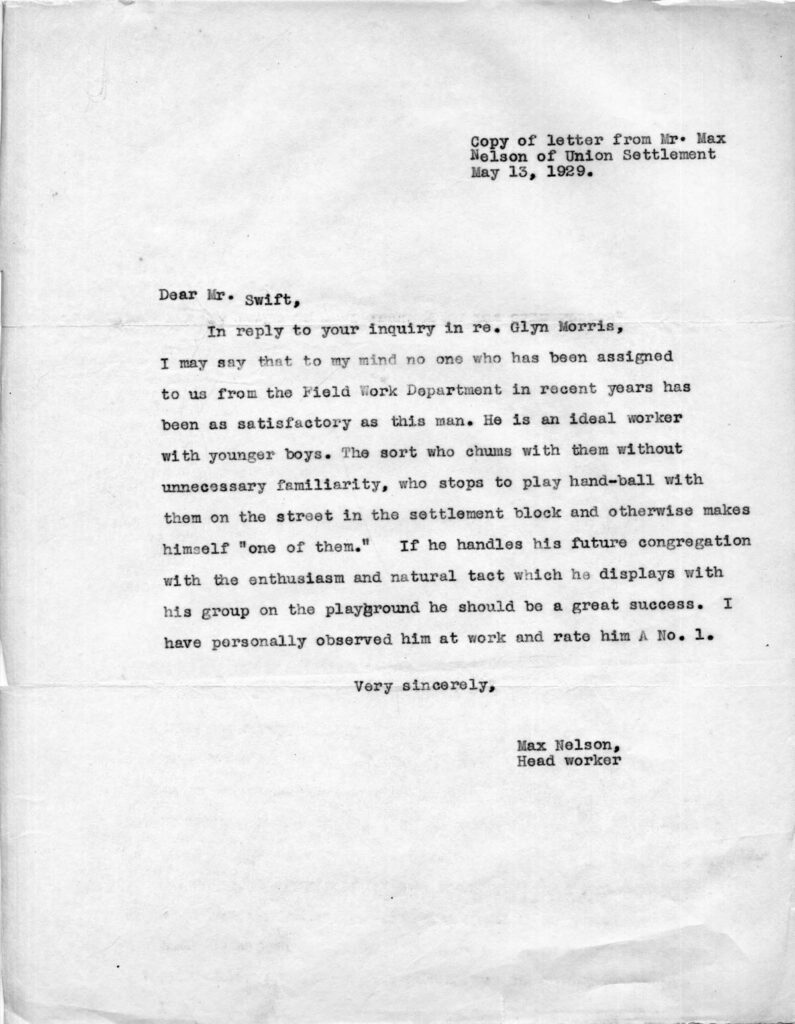
[BOT_meeting_1929_001.jpg]
It was Darwin D. Martin who “cast the die” that brought Glyn Morris to Pine Mountain. Glyn Morris was hired and grew to become one of the strongest and most remarkable of the Directors of Pine Mountain Settlement School —- his was a talent that was to take the School in a very different direction.
GLYN MORRIS: His Early Years
In reviewing his history it is little wonder that Glyn Morris found such admiration from Darwin D. Martin and such affinity with Pine Mountain. Beginning his life in the slate-mining country of Wales and immersed in the coal-mining community of Wilkes-Barre, Pennsylvania, Morris was no stranger to hard times. His early years provided a point of reference that seems to have given shape to many of his decisions throughout his life. Glyn Morris melded his Welch heritage with the education he received at Albright College (A.B.) in Reading, PA, and with the growing Progressive Education Movement that was gaining attention across the country. He later added to his vision following his training at Union Theological Seminary (B.D., 1931) in New York City. At Union Theological, Morris was strongly influenced by Reinhold Niebuhr, a well-known theologian and philosopher, and other luminaries in the Seminary.
GLYN MORRIS: As PMSS Director
At the age of twenty-seven, Morris was remarkably prepared for the task ahead of him. Summarizing his years at the School, the Pine Mountain Family Album 1943 he describes his work at Pine Mountain Settlement School during his tenure and gives credit to his wife Gladys for her supporting role
In 1931 Glyn Morris and his wife, Gladys came to Pine Mountain from New York City, where Morris had just graduated from Union Theological Seminary and where Gladys had been nursing at the Henry Street Settlement. Lillian Wald, the founder and a leader in settlement work, had retired the year before in 1930 and had established one of the foremost programs in community nursing.
LEAVING THE SCHOOL
The Album then describes Morris as he left the School after a tenure of ten years.
In 1942 Mr. Morris enlisted in the Chaplains’ Corps of the U.S. Army. The school bears the stamp of his personality and enjoys the fruits of his brilliantly directed energy. During the … years Mr. Morris has carried Pine Mountain deeply into the whole educational program of the South, as well as into the social and economic life of the country, serving as Secretary of the Harlan County Planning Council and President of the Southern Mountain Workers’ Conference. Mrs. Morris has made her own unique contribution to the life of the school in countless practical and personal ways, as director of houses and grounds.
The following is an excerpt from a biography provided to the Council of Southern Mountain Workers, by Miss Alice Cobb, Field Secretary for Pine Mountain at the time and a loyal supporter of Morris. The biography was in support of Morris who was asked to become the Executive Secretary (1945-1946) for the Council following his departure from Pine Mountain. The biography was part of an article titled “Executive Secretary” in Mountain Life & Work, vol. 21, no. 2 (Fall 1945).…
[Glyn Morris] grew up in Wilkes-Barre, Pennsylvania, where he had the experience of working in the coal mines. This was, of course, invaluable in his later work in Harlan County. [After attending college, he] came almost immediately to Pine Mountain as Director, and served until 1942, when he entered the army as a Chaplain. He is an ordained minister in the Presbyterian Church.
Mr. Morris built up the educational and vocational programs at Pine Mountain in a dramatic way. He introduced the Cooperative Store project, the Community Service program as part of the school curriculum, and the plan for Guidance Counsel which has made the school unique, and which, along with other progressive features of our program, has been discussed in Mountain Life and Work.
His influence was (and is) strongly felt all through Harlan County. Through the Pine Mountain Guidance Institute [later Rural Youth Guidance Institute] , the school secured its position of leadership, educationally and socially, in county activities and soon gained National recognition. Mr. Morris was a strong leader in the Harlan County Planning Council, which was one of the more widely known outgrowths of the Institute. ….
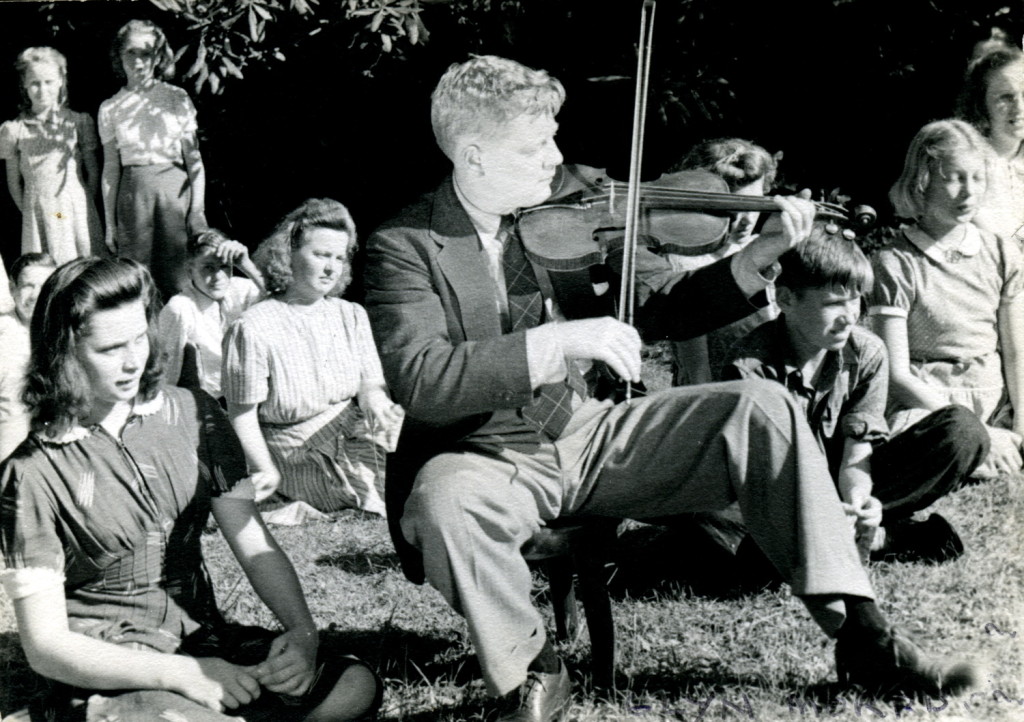
Glyn Morris playing fiddle. X_100_workers_2614_mod.jpg (dup)
The Berea College Archival Record provides a body of work in microfilm that duplicates that found at Pine Mountain. In the history written for the Guide to the Pine Mountain Settlement School Records is a description of Glyn Morris’s service to Pine Mountain, as follows
…Death and/or retirement of the founders brought Glyn Morris to the directorship in 1931. Instead of solving socioeconomic problems with special services, he sought to address such problems through the school program itself. Morris and the staff emphasized the uniqueness of each student and focused on preparing them for the realities of life after leaving Pine Mountain. Staff restructured the curriculum and with the help of students, rewrote texts. First-year students were given a survey course covering all areas of learning offered by the school.
GLYN MORRIS: Uneasy Times at PMSS
Pine Mountain Settlement was not easy for Morris, nor were his accomplishments appreciated by all. In 1937 after a startling number of accomplishments, he stumbles and questions whether he should stay on at the School given a recent barrage of complaints against him and a growing threat from the Harlan County community that identified him with Union activity — hence a Communist — (in the minds of some) activity. The animosity regarding his Union association followed a brief but innocent encounter with a former Union Theological schoolmate [Anderson] who had come to Harlan County advocating for the coal miner’s Union and who had well-known Communist leanings.
1937 was a very rough year for Glyn Morris. It was in 1937 that he gave a very telling talk to the staff and students at Pine Mountain that captures both his personal angst and the tensions of the time. Titled “Tight Places …” the talk intimately reveals both his brilliance in working with and persuading others, particularly students, as well as his own personal vulnerabilities.
Morris handled the early personal reckoning incident in Harlan very well, but it left him shaken and cautious for the remainder of his time at the School. In January of 1937, he wrote to his mentor and former professor, Dr. Arthur Swift, Jr., at Union Theological Seminary, that he and Gladys were both inclined to leave their positions at the School. He cited as the most important reason that neither he nor Gladys “… can bring ourselves around to a firm conviction that what we are doing is really worthwhile.” He then goes on to describe in detail the reasons that pressed so strongly upon the couple. [To read this pivotal letter see GLYN MORRIS 1937 Correspondence, January 25, 1937.]
Morris had convinced himself that “any possibility of social reform was out of the question in Harlan County. This place is utterly vicious. Every town in the county is owned by an operator. It is a county of families, and justice of any sort can only be obtained with a pistol.” He asks Dr. Swift to “… tell us in all frankness just what you think.” Swift does that quite frankly and salvages Morris and his wife from their deep uncertainty and sets them on a more positive track regarding their work in Harlan County. Following that wise advice, Morris seems to have conquered his self-doubt and the couple then remains at Pine Mountain until late 1941, finishing out ten years with the institution. What
GLYN MORRIS: His Growth at PMSS
During those ten years, his accomplishments were many. He learned to dance, to play a fiddle, and to sing, and sing and sing some more. But is is how his song resonated with the lives he touched at the School that made the difference for the students as well as for Glyn Morris.
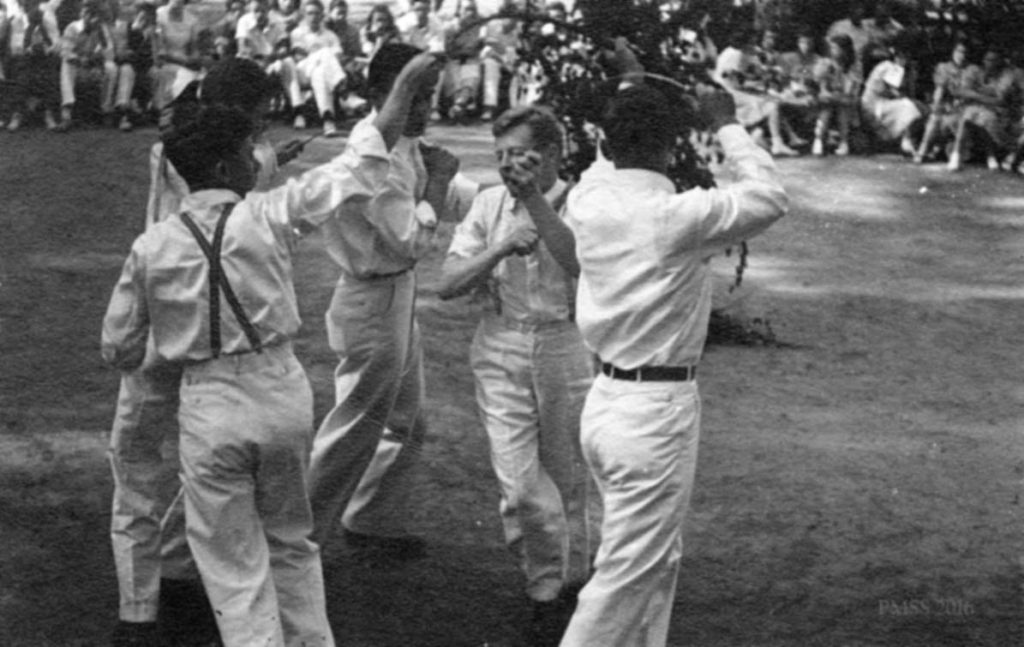
Sword dancing on the Dancing Green, late1930s. William Hayes (back to the camera, rt.) Glyn Morris (center), Paul Hayes, ?, ? [burkh_004.jpg]
What Glyn Morris found in the intervening years was a deep understanding of human nature and an aptitude for designing educational programs and for bringing people together. Not only did he grow in management skills, but he also grew in self-knowledge, and in organizational skills. His skills at enriching the Pine Mountain Settlement educational programs and his work at creating the Rural Youth Guidance Institute established him as a leader in education in the Nation. He was recognized for his models for attacking deficits in rural education. His programs were adopted by educators across the country. He literally put Pine Mountain on the map of Progressive education in the country by demonstrating that it was an educational model not just for urban areas but combined with Industrial education, could offer rural schools methods to reach and enrich the education of rural youth. For example, some of his innovations may be seen here
Second-year students managed the cooperative store, sold shares, kept accounts, stocked shelves, and analyzed the nutritional value of foods sold. Third-year students studied community life in the classroom and served as aides to health workers, teachers, and recreation workers. The fourth-year was spent in intensive preparation for the work each student planned to pursue after finishing at Pine Mountain. Students also shared in the making and enforcing of rules governing student life through an elected Citizenship Committee.
This unique educational approach continued throughout the Glyn Morris years and to a large extent through the administrations of William D. Webb, 1942-44, and H.R.S. Benjamin, 1944-49.
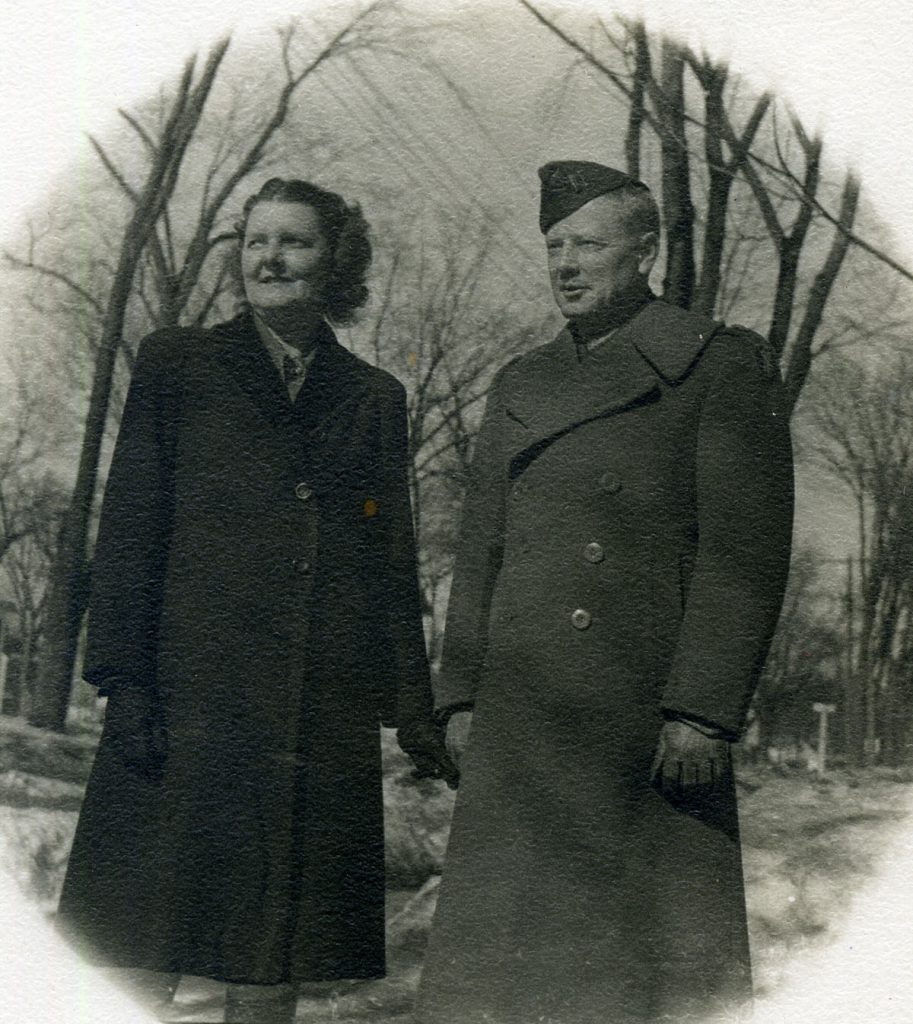
Capt. Glyn Morris and Gladys Morris, c. 1944. [Gladys_and_-Glyn_Morris_c.-1942_119.jpg]
GLYN MORRIS: After Pine Mountain
The entry of the United States into WWII was the event that ended Morris’ stay at Pine Mountain Settlement School. The lead-up to the war and the huge impact on the lives of so many, deeply affected Morris and in 1941 he announced that he would leave Pine Mountain to join the war effort as a Chaplain in the Army. Concerning Morris’ request to temporarily leave PMSS and serve in the Army during WWII, History PMSS Summaries 1941-1942 records the following:
Mr. Morris submitted to the November 15 [1941] Board of Trustees meeting a written request for leave of absence to join one of the services for the duration of the war, in the event of the United States’ entry. After careful consideration, the Board pointed out its hope that he would again weigh most carefully the relative values of his service to the country and the school. Subsequently, Mr. Morris volunteered as Chaplain in the U. S. Army and left for service on May 15, 1942. He asked for a leave of absence for one year, with the understanding that if he is not able to return at the end of the year the Board would be free to appoint a permanent successor. A leave of absence without salary, for a year from his May 15, 1942, departure from PMSS, was voted at the June 13, 1942 Board Meeting.
The departure of Glyn Morris from Pine Mountain brought this tribute in the October 1942 Notes when William Webb came to campus to replace him:
Volume XV
OCTOBER, 1942
Number 11
EARLY last spring Rev. Glyn A. Morris, Director of Pine Mountain, volunteered as Chaplain in the army, and left for service on May 15th, on leave of absence for one year. Mrs. Morris joined him three weeks later, in Joplin, Missouri. Mr. Arthur Dodd, Principal of the School, and for ten years a worker here, was asked by the Board of Trustees to assume leadership until August 1st, when Mr. William D. Webb came to Pine Mountain as Acting Director. … … The friends who have followed Pine Mountain through so many hard readjustments in the past, will share with us now another new experience. We realize the great loss the school will suffer in Mr. Morris’ absence. We also [recognize] that in making such a sacrifice for the interests of this country, Pine Mountain has moved farther in the direction of the idealism determined by its leadership from the beginning, and has contributed to a national emergency in the most [fundamental] way possible.
Since Mr. Morris’ departure, those of us who carry on have been increasingly aware of the fine piece of constructive organization to which we belong. It is tribute to the devoted work of this decade that the school stands unshaken, in every department equal to the crisis of a change of administration. Finally, we are grateful for the tact and graciousness with which the Webbs have come into our fellowship. In a community so small, and in many ways so self-sufficient, it is very difficult for a new personality to enter at the head. The spirit of the past ten years’ leadership has strengthened us to accept and welcome the new, and the good will of the new acting administration has made the welcome easy for us. Pine Mountain, braced by the same pioneering spirit which came with Katherine Pettit and Ethel deLong in 1913, faces the future with confidence, “business as usual.”
After distinguished service in Europe in World War II from 1942 to 1944, Glyn Morris wished to return to Pine Mountain, but the bargain he had forged with the Board created an administrative roadblock. The earlier agreement did not allow him to return and, instead, he entered into a difficult dialogue with the Board. The roadblock became heated and Morris opted to move on and not try to regain his position at the School. Instead, he furthered his studies at Columbia University Teachers College, New York City, NY, obtaining his doctorate degree in education in 1951.
Morris taught at Columbia University and at other institutions part-time and served on several national commissions on education and on the Advisory Board of Asheville-Biltmore College, the precursor of UNCA. While in New York he also met a kindred spirit in the literary giant, Edmund Wilson. Wilson, a strong influence on many writers, including Thomas Wolfe and others had much in common with Morris. Following the death of the Asheville author, Thomas Wolfe, Wilson edited and published Wolf’s unpublished works and gained national recognition for his astute literary criticism. The two curmudgeons, Wilson and Morris were destined to spend their waning years as neighbors in Wilkes-Barre, Pennsylvania.
However, that last chapter was still far off when Morris, believing he was not yet done with Harlan County, returned to Evarts in 1947 at the invitation of County Superintendent of Schools, James A. Cawood, to be Principal of the Evarts schools. His return to Harlan County was a victory for both Morris and for his admirer, Cawood, and the County of Harlan. Morris served with distinction and his characteristic ingenuity in the Evarts position until late 1950. From that date forward, his career took him away from Harlan County and into ever-increasing responsibilities. (See the vita below).
His life included two marriages, first to Gladys Jones (born c. 1901 in Vermont), who was with him at PMSS and worked as an assistant in the library, in addition to her nursing and buildings and grounds assignments mentioned above. After Gladys’ death from cancer, Morris married Barbara Hoskins, a home economics teacher who remained with him until the end of his life in Wilkes-Barre, PA.
- Gladys Morris, wife of Director, Glyn Morris, c. 1937. [X_100_workers_2641_mod.jpg]
- Glyn and Gladys Morris. [X_100_workers_2560_mod.jpg]
- Glyn and Glady Morris, c. 1944. [pmss_photo_MOD_morris_capt__mrs_enlarged-2.jpg]
In 1970, Morris returned to Wilkes-Barre, the place of his beginnings, where he continued writing the last of his books on education and where he established a deep relationship with his friend and literary critic, Edmund Wilson, and his circle.* The Wilkes-Barre years are well covered in his autobiography, Less Travelled Roads. New York: Vantage Press (1977), and reveal another side of Morris that he nurtured in the last years of his life. The details of his friendship with Edmund Wilson are gathered in a biography (unpublished) that is in the Beineke Library at Yale.
In 1976 Glyn Morris made his last trip to Pine Mountain. Before coming he established an itinerary that included many of his friends from the 1930s and 1940s and a trip to Evarts, where he spent his final years in Harlan County. He wrote to Alice Cobb, a teacher who was a close friend at Pine Mountain, about his trip. In his letter, one can see the continuing deep attachment to the School and his concerns for its future. A copy of the letter originally addressed to his former secretary, Alice Cobb, was sent by Morris to Fern and Bill Hayes, with whom he kept in continuous contact over the years, as he did with many of his Harlan County and Pine Mountain Settlement friends. The letter to his former colleagues is a list of his recommendations for remediating some of the issues he saw at the school on his brief last visit.
See: Glyn Morris Letter To Alice Cobb, 1976
**********
An intimate profile of Glyn Morris’s life may be found in his autobiography, Less Travelled Roads. New York: Vantage Press, 1977. His years in New York State are also revealed in his friendship with the well-known literary critic and author, Edmund Wilson, and in Wilson’s autobiography and reflections on their friendship.
Glyn Morris died on October 8, 1993, in Wilkes-Barre, PA and was buried at Mount Greenwood Cemetery in Trucksville, PA. He was preceded in death by his first wife, Gladys, his sister, Lillian Morris, and brother, Walter Morris.
GLYN MORRIS: Affiliations and Organizations
- Pine Mountain Guidance Institute, Pine Mountain, KY;
- Secretary, Harlan County (KY) Planning Council;
- Graduate, Chaplains’ School at Harvard University, Cambridge, MA;
- Executive secretary and quarterly editor for the Council of Southern Mountain Workers, Berea, KY, c. 1944 – 1946;
- Supervising principal, Evarts (KY) Schools, KY, 1947 – 1950;
- Assistant superintendent of curriculum and guidance, Sole Supervisory; District in Lewis -County, NY, 1951 – 1968;
- Title 1 Director of Sole Supervisory District of Lewis County, Lyons Falls, NY, director of research and special projects, 1965 – 1969;
- Teacher at the University of Kansas City (KS), Fredonia (NY) State College, University of Maine (Orono, ME), University of Buffalo (NY), St. Lawrence University (Canton, NY), Columbia University (NYC) and Syracuse (NY) University, summers 1952 – 1969;
- Teacher at Western Maryland College (Westminster, MD) for one year after retiring in 1969;
- Life member, American Personnel and Guidance Association and the Rural/Regional Education Association;
- Commissioned a Kentucky Colonel by Gov. Julian Carroll, 1976;
- Member, University of North Carolina Advisory Board (Asheville Biltmore College), the 1960s.
ADMINISTRATIVE FULL-TEXT DOCUMENTS
GLYN MORRIS “1940 General Statement of History and Philosophy of PMSS for Staff“
See revision by Arthur Dodd, 1946. “General Statement of History and Philosophy of Pine Mountain Settlement School.”
GLYN MORRIS “Philosophy of Secondary Education”
A position paper for staff workers at PMSS
GLYN MORRIS “Challenge for Today”
GLYN MORRIS 19437(?) “Is There Any Further Need of a School Like Pine Mountain Settlement School?”
GLYN MORRIS 1939 “Progressives in the Kentucky Mountains”
DIRECTORS’ ANNUAL REPORTS TO BOARD OF TRUSTEES Guide
Glyn Morris 1931-1941 “General Review for BOT on Work at PMSS”
Cumulative report by Morris of his 10 years at Pine Mountain
GUIDE TO CORRESPONDENCE (by year)
GLYN MORRIS Correspondence 1932
GLYN MORRIS Correspondence 1933
GLYN MORRIS 1932-34 Correspondence Oma Creech
GLYN MORRIS Correspondence 1934
GLYN MORRIS Correspondence 1935
GLYN MORRIS Correspondence 1936
GLYN MORRIS Correspondence 1937 (Arthur Swift Letters)
GLYN MORRIS Correspondence 1938
GLYN MORRIS Correspondence 1939
GLYN MORRIS Correspondence 1940
GLYN MORRIS Correspondence 1941
GLYN MORRIS Correspondence 1942
GLYN MORRIS Correspondence 1943
GLYN MORRIS Correspondence 1944
GLYN MORRIS Correspondence 1945
GLYN MORRIS Correspondence 1950s
GLYN MORRIS Correspondence 1976
RURAL YOUTH GUIDANCE INSTITUTE
Rural Youth Guidance Institutes Guide by Year (1937-1964)
Series 13: Education – Rural Youth Guidance Institutes
RURAL YOUTH GUIDANCE INSTITUTE 1937 Findings
RURAL YOUTH GUIDANCE INSTITUTE 1941 Findings (Newspaper clipping)
GUIDE TO WRITINGS (While at PMSS)
GLYN MORRIS 1931-1977 Guide to Talks, Writing and Publications
GLYN MORRIS Study and Recommendations PMSS I Southern Mountain Region
GLYN MORRIS 1939 Community Service in the Curriculum
GLYN MORRIS Challenge for Today
GUIDE TO WRITING BEYOND PINE MOUNTAIN (For full bibliography see below)
GUIDE TO TALKS
GLYN MORRIS 1931-1977 Guide to Talks, Writing and Publications
GLYN MORRIS TALKS 1937 ‘Tight Places’, including a prayer.
GLYN MORRIS 1939 Harlan Kiwanis Club Talk
GLYN MORRIS TALKS 1940 Biltmore College Baccalaureate
PHOTOS
Search Media
SEE ALSO: Related Material
AUGUST ANGEL Correspondence– Includes a letter from Angel that describes meeting Morris in Europe during their WWII tours of duty.
EVERETT K. WILSON – StaffPine Mountain Settlement School early Guidance Counselor and Instructor who trained under the guidance of Glyn Morris and later as faculty at the University of North Carolina Chapel Hill, became a major scholar in the field of Sociology.
GOVERNANCE BOT 1931 Correspondence – Images & list of contents of letters with Morris and among the PMSS Board of Trustees related to the consideration and confirmation of Glyn Morris’s appointment as PMSS Director.
RURAL YOUTH GUIDANCE INSTITUTE
| Title | Glyn Morris |
| Alt. Title | Glyn Allen Morris ; Glyn A. Morris ; |
| Identifier | https://pinemountainsettlement.net/?page_id=1015 |
| Creator | Pine Mountain Settlement School, Pine Mountain, KY |
| Alt. Creator | Ann Angel Eberhardt ; Helen Hayes Wykle ; |
| Subject Keyword | Glyn Morris ; Glyn Allen Morris ; Pine Mountain Settlement School ; administrative staff ; directors ; education ; progressive education ; John and Emma Morris ; coal mining ; slate mining ; Reinhold Niebuhr ; PMSS Family Album, 1943 ; Henry Street Settlement ; Chaplains’ Corp ; U.S. Army ; Harlan County Planning Council ; Southern Mountain Workers’ Conference ; Miss Alice Cobb ; Council of Southern Mountain Workers ; Mountain Life & Work ; Presbyterian Church ; Cooperative Store project ; Community Service program ; Guidance Council ; Pine Mountain Guidance Council ; UNCA Advisory Board ; Asheville Biltmore College ; Edmund Wilson ; Lillian Morris ; Walter Morris ; curriculum ; survey courses ; coop store ; nutrition ; community life ; student government ; citizenship committee ; William D. Webb ; H.R.S. Benjamin ; Gladys Jones ; Barbara Hoskins ; American Personnel and Guidance Association ; Rural/Regional Education Association ; Kentucky Colonel ; Governor Julian Carroll ; Harlan County, KY; Glyn Ceirog, Wales ; Wilkes-Barre, PA ; Reading, PA ; New York City, NY ; Berea, KY ; Trucksville, PA ; Cambridge, MA ; Evarts, KY ; Lewis County, NY ; Lyons Falls, NY ; Kansas City, KS ; Fredonia, NY ; Orono, ME ; Buffalo, NY ; Canton, NY ; Syracuse, NY ; Westminster, MD ; Asheville, NC ; |
| Subject LCSH | Morris, Glyn Allen, — February 20, 1905 – October 8, 1993. Educators — Biography. Education counseling. School principals. Pine Mountain Settlement School (Pine Mountain, Ky.) — History. Harlan County — History. Education — Kentucky — Harlan County. Rural schools — Kentucky — History. Rural schools — Appalachian Region, Southern. Schools — Appalachian Region. |
| Date | 2004-06-26 |
| Publisher | Pine Mountain Settlement School, Pine Mountain, KY |
| Contributor | n/a |
| Type | Text ; image ; |
| Format | Originals and copies of documents and correspondence in file folders in filing cabinet |
| Source | Series 7: Director’s Files |
| Language | English |
| Relation | Is related to: Pine Mountain Settlement School Collections, Series 7: Director’s Papers |
| Coverage Temporal | 1905 – 1993 |
| Coverage Spatial | Pine Mountain, KY ; Harlan County, KY; Glyn Ceirog, Wales ; Wilkes-Barre, PA ; Reading, PA ; New York, NY ; Berea, KY ; Trucksville, PA ; Cambridge, MA ; Evarts, KY ; Lewis County, NY ; Lyons Falls, NY ; Kansas City, KS ; Fredonia, NY ; Orono, ME ; Buffalo, NY ; Canton, NY ; Syracuse, NY ; Westminster, MD ; Asheville, NC ; |
| Rights | Any display, publication, or public use must credit Pine Mountain Settlement School. Copyright retained by the creators of certain items in the collection, or their descendants, as stipulated by United States copyright law. |
| Donor | n/a |
| Description | Core documents, correspondence, writing, and administrative papers of Glyn Allen Morris ; clippings, photographs, books by or about Glyn Allen Morris ; |
| Acquisition | n/d ; 1930s and early 1940s ; |
| Citation | “[Identification of Item],” [Collection Name] [Series Number, if applicable]. Pine Mountain Settlement School Institutional Papers. Pine Mountain Settlement School, Pine Mountain, KY. |
| Processed by | Helen Hayes Wykle ; Ann Angel Eberhardt ; |
| Last updated | 2008-10-30 hhw ; 2013-10-05 hhw ; 2013-10-08 aae ; 2015-09-07 hhw ; 2016-09-04 hhw ; 2018-05-21 hhw; 2019-03-28 hhw; 2021-03-26 hhw ; 2022-04-14 hhw ; 2022-07-10 aae ; 2023-06-22 hhw ; 2023-06-23 hhw ; |
| Bibliography |
Morgan, Colin, and Glyn Morris. Good Teaching and Learning: Pupils and Teachers Speak.New York: Open University Press, 1998. Print. Morgan, Colin, and Glyn Morris. “The Student View of Tutorial Support: Report of a Survey of Open University Education Students.” Open Learning: the Journal of Open and Distance Learning. 9.1 (1994): 22-33. Print. Morris, Glyn A. “A Challenge for Today.” Mountain Life & Work. (Winter 1942). Print. Morris, Glyn, and Ernest Gosline. Mobilizing a Rural Community for Mental Health: A Report.Lyons Falls, NY: Lewis County Board of Cooperative Educational Services, 1964. Print. Morris, Glyn, and Evarts (KY) High School. Guidance Methods for the Principal. Teachers College, Columbia University, 1951. Print. ( Ed.D thesis). Morris, Glyn. A Guidance Program for Rural Schools. Chicago: Science Research Associates, 1955. Print. Morris, Glyn. The High School Principal and Staff Study Youth. New York: Teachers College, Columbia University, 1958. Print. Morris, Glyn A., and Judith Wheater.Born for Joy: A Unique Summer Program for Disadvantaged Children During July, 1966. Lyons Falls, NY: The Board of Cooperative Educational Services, 1967. Print. Morris, Glyn. Less Travelled Roads. New York: Vantage Press, 1977. Print. AUTOBIOGRAPHY *Morris, Glyn. Nights and Days with Edmund Wilson: An “Upstate” Friendship. Typescript draft of Glyn Morris’ memoir of his friendship with Edmund Wilson (1895-1972) from roughly 1950 to 1970. Gift of Barbara Morris to Yale Collection of American Literature, Beinecke Rare Book and Manuscript Library, in 2000. Unpublished Print. Morris, Glyn. Practical Guidance Methods for Principals and Teachers. New York: Harper, 1952. Print. Morris, Glyn. “Private Schools and Democracy.” The American Scholar. 11.2 (1942): 251-252. Print. Morris, Glyn. “Progressive Education in the Kentucky Mountains,” Mountain Life & Work. 06 (October 1937): 5. Copy is re-print for PMSS. Morris, Glyn. “Rural Guidance: Its Special Problems.” Vocational Guidance Quarterly. 3.2 (1955): 35-37. Print. Morris, Glyn. “A Search for Pupil Viewpoints: How 5 Schools Made Plans Based on Pupil Needs.” The Clearing House. 29.3 (1954): 131-134. Print. Morris, Glyn. A Study of Industrial Relations in the United States of America. 20th Century Press for the United States Information Service, 1964. Print. Morris, Glyn.Using a Timetable in Educational Guidance. Washington: Dept. of Rural Education, National Education Association, 1961. Print. Strang, Ruth May, and Glyn Morris. Guidance in the Classroom. New York: Macmillan, 1964. Print. “United States Census, 1940.” index and images, FamilySearch. https://familysearch.org/pal:/MM9.1.1/K7TW-T6T (accessed 06 Jan 2014). Gladys Morris in the household of Glynn Morris, Magisterial District 4, Harlan, Kentucky, United States; citing enumeration district (ED) 48-33, sheet 61A, family 416, NARA digital publication of T627, roll 1314. Internet resource. |
Return to BIOGRAPHY – A-Z

